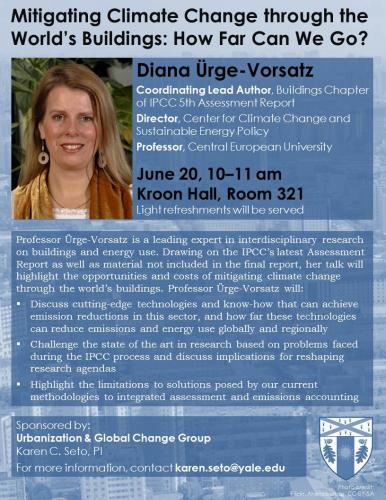Buildings expert Diana Ürge-Vorsatz to give talk
 On June 20, the Seto Lab is sponsoring a talk by Diana Ürge-Vorsatz, professor at Central European University. Professor Ürge-Vorsatz is a leading expert on interdisciplinary research on buildings and energy use. She is the Director of the Center for Climate Change and Sustainable Energy Policy at CEU and a Coordinating Lead Author of “Buildings” chapter in the IPCC’s 5th Assessment Report on climate change mitigation.
On June 20, the Seto Lab is sponsoring a talk by Diana Ürge-Vorsatz, professor at Central European University. Professor Ürge-Vorsatz is a leading expert on interdisciplinary research on buildings and energy use. She is the Director of the Center for Climate Change and Sustainable Energy Policy at CEU and a Coordinating Lead Author of “Buildings” chapter in the IPCC’s 5th Assessment Report on climate change mitigation.
When: June 20, 10-11 am
Where: Kroon Hall, Room 321
Full Description: Professor Ürge-Vorsatz’s talk will highlight the opportunities for and costs of mitigating climate change through the world’s buildings, largely drawing on the findings of the Fifth Assessment Report of the Intergovernmental Panel on Climate Change based as well as what did not get included into the report. First, the talk will highlight selected cutting-edge technologies and know-how that can help deep emission reductions in this sector, showing examples of 95% achieved reductions. The talk will then present the scenarios from the world’s most detailed building energy model and show how far these technologies can go in reducing emissions and energy use globally and regionally. The cost-effectiveness aspects will also be discussed. The talk will show the latest findings related to the feasibility of the net zero energy building concept in different world regions, climate and building types. In contrast to the major opportunities the talk demonstrates, it will also highlight the major risk of lock-in in a quantified way. The talk will end by challenging the state-of-the-art in research based on problems faced during the IPCC work and the implications of these on dramatically reshaping research agendas. More concretely, the talk will first contrast the vast diversity of mitigation strategies in the solutions space to the portfolio of options typically assessed and the far-reaching repercussions of these. Then, it will highlight the limitations to solutions posed by our current methodologies to integrated assessment and emissions accounting, among others. The talk hopes to inspire dramatically new directions for interdisciplinary research in mitigation.
